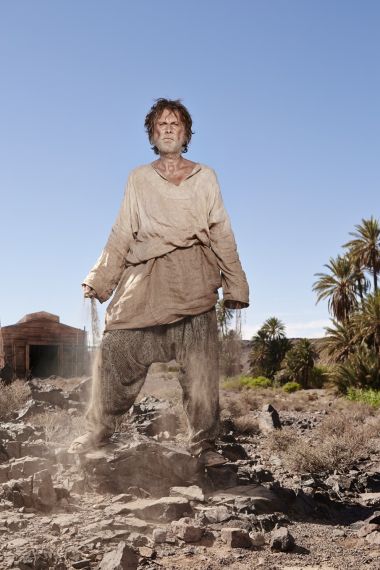BBC's The Ark stayed afloat, just about

It's a very long way from Albert Square to Ararat. But then it was almost as far to Bethlehem, and Tony Jordan managed that.
Five years ago the veteran scriptwriter (he's written around 200 episodes of EastEnders) turned his hand to the Nativity, scoring a critical and popular hit. Filmed in Morocco, its Middle East was rough, dirty and authentic, and its characters – informed not just by the art of a top storyteller but by Jordan's conversations with biblical scholars – were recognisably human.
Last night's broadcast of The Ark on BBC 1 gave us the dramatist's take on Noah. It had the same sun-baked, washed-out landscape – not for him the Technicolor brilliance of the swords-and-sandals epics of yesteryear, and the CGI miracles of Russell Crowe's Noah were entirely absent. The preoccupation with the human dilemmas at the heart of the biblical story was there, too: and while Crowe's patriarch is a brooding religious fanatic, whose obsession makes him capable of murder, Tony Jordan writes him as a decent family man trying to cope with something too big for him to handle.
The Bible doesn't really tell us much about Noah and his family. We don't even know the women's names; Mrs Noah (Joanne Whalley) becomes Emmie. But read the story with a screenwriter's eyes and it's easy to see how the strains and stresses of the Ark project must have brought it to breaking point. A ship the size of a football pitch on the edge of the desert? Seriously?
Jordan takes the biblical story as his starting point, but he doesn't feel tied to it. He's also read the version in the Koran, taking from that the idea that there was a fourth son who didn't make it aboard.
So it isn't just about God's judgment on a wicked world. It's about family: its loyalties, loves and losses. In Jordan's telling, Noah's family is a sort of cross between Bedouin and Amish, with Noah – brilliantly played by David Threlfall, best known as the wastrel Frank in Shameless, as a benevolent patriarch intent on keeping them together and away from the temptations of the wicked city.
The sons and their wives want their own lives, but they're devoted to their parents too and have to negotiate the tricky path to interdependent adulthood: not so far from Albert Square after all, then. And when the family is brought round and starts to help the old man instead of standing aloof from his delusions, it's their faith in him, not in God, that makes them do it.
It's a human drama, but that's not to say that God is absent – far from it, and if there's a criticism to be made it's that the authorial voice is a little too loud. Jordan makes direct and thoroughly intentional parallels between the wicked world in which Noah stood firm and the world of today. "The world is run by money-lenders and warmongers," Noah says. The city trader (Don Warrington) says: "The moneylenders get rich, the strong get fat – it's the same the world over." At the end, an angel (very ordinary-looking) asks Noah, "Do you think man will learn his lesson?" "Time will tell," comes the sombre reply.
Jordan doesn't exactly describe himself as a believer, but he's a seeker who's fascinated by faith. That comes through as well. The city-dwellers aren't just greedy and violent, they are atheists in the Richard Dawkins mode: "We don't need to invent a god to tell us who we are, we have science," says one. But Noah's answer is that while it's alright to doubt, "Only an idiot would say that there is no God" – because to be definite about that, one would have to know everything there is to know.
One of the most interesting aspects of the film comes out of Jordan's reflections on the biblical story. Read Genesis and try to step outside the presuppositions of faith, and Noah – righteous or not – comes across as a chilling, even a repellent figure. Abraham pleaded for Sodom (Genesis 18: 16-33); Noah doesn't say a prayer for an entire world. Every human being perishes except his own family. The first words he utters (Genesis 9:24) are a curse.
Jordan's Noah is a much more sympathetic character, doing his best to persuade others to join him, and successfully; room is found for a good number of refugees as well as the biblical eight. Asked why at an advance screening for religious leaders, he said: "I believe the Ark was there for people of faith. I don't believe in a version of God that would say, 'Build the Ark to save good people, but only these good people.' That would be ridiculous."
The Ark was a good story well told. Of course it required a willing suspension of disbelief, like every such enterprise, and more so for Christians who would be inclined to check it against their recall of the biblical story. If there was anything that really grated, it was for artistic and dramatic reasons rather than theological: the cut-price CGI flood at the end didn't do justice to some of the subtleties of the earlier writing. In Jordan original conception the story was to end with a single raindrop falling on Noah's hand; he thought the audience would have been disappointed if they didn't get a proper deluge. Second thoughts are usually best, but not in this case.











